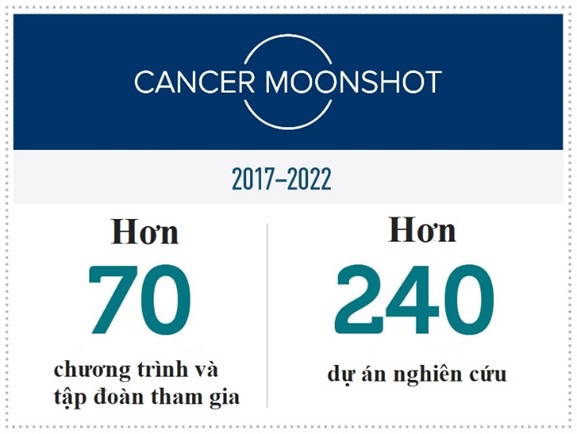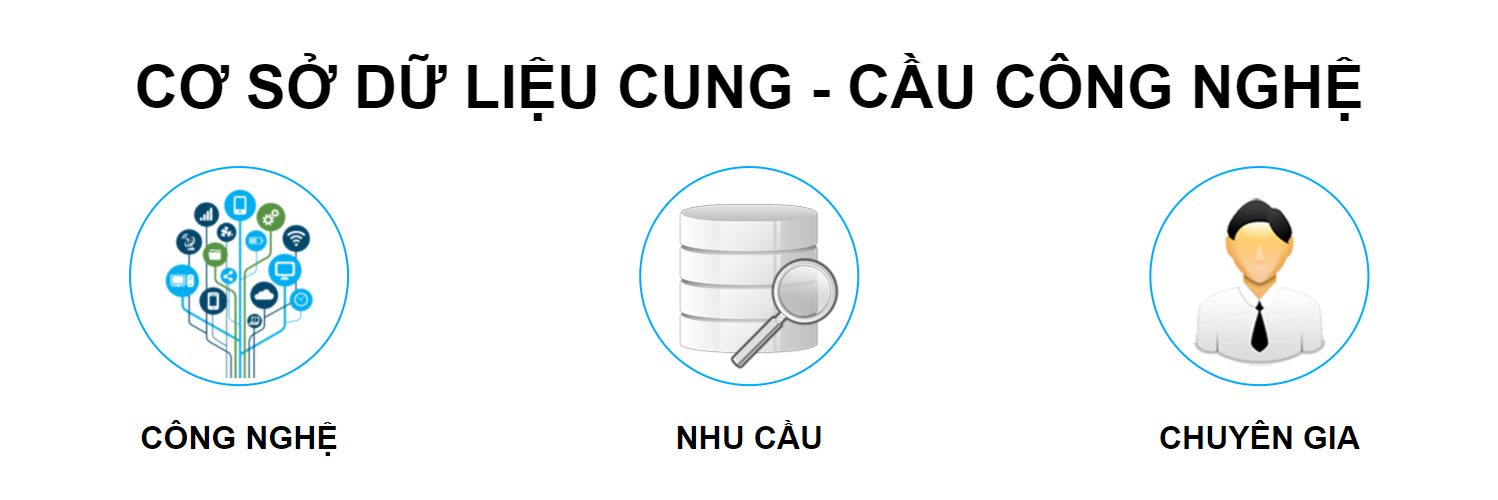Website Liên kết
America and new plans to end cancer
Cancer is one of the most difficult diseases to treat for humans today because of the diversity of this disease such as: lung cancer, breast cancer, colon cancer... From 2022, US President Joe Biden and First Lady Jill Biden have relaunched the Cancer Moonshot Program* with the ambition: “Reduce cancer mortality by at least 50% over the next 25 years, working toward improving the condition of people after suffering from cancer and ultimately ending cancer.”

Cancer Moonshot: After 1 year of restart
So far, Cancer Moonshot has announced more than 25 programs and policies to address the above priority issues in collaboration with more than 60 private companies, nonprofit organizations, academic institutions and patient groups. After more than 1 year of restart, the Program has the following activities:
First, launch the website WhiteHouse.gov/CancerMoonshot - where cancer patients can share their stories of inspiration and hope to fight the disease. Here, people can come up with ideas to call for support from organizations and companies to achieve the goals set out by the Program.
Second, President Joe Biden established the ARPA-H - an agency specializing in providing new methods to prevent, detect, and treat cancer, as well as other serious diseases. The US government guarantees an initial investment of 2.5 billion USD and for the 2023 fiscal year alone is 1.5 billion USD.
Third, US Ministry of Agriculture announced the establishment of Agricultural Sciences Center for Nutrition and Diet to accelerate research on chronic diseases (including cancer) related to diet. drink, to provide solutions to improve public health under the support of the Cancer Moonshot Program and the National Hunger, Nutrition and Health Strategy.
Fourth, US Centers for Disease Control and Prevention has funded more than 200 million USD (in a commitment worth more than 1 billion USD) to promote cancer prevention and control through cancer screening programs. mail to every state and territory of the United States.
Fifth, the US Environmental Protection Act has committed to invest $7.4 billion in helping states replace pipelines and service lines to protect millions of homes from "chemicals forever" and other contaminants may increase the risk of certain cancers.
Sixth, by January 2023, the US Department of Veterans Affairs has conducted toxic exposure screening for 1.5 million veterans. In November 2022, the US Department of Veterans Affairs also announced the promotion of benefit requests to help veterans with cancer have timely access to health care and financial benefits. other.
Seventh, US Food and Drug Administration has proposed rules banning menthol cigarettes and flavored cigars. If these proposals are adopted, this will be a prerequisite for preventing up to 654,000 smoking-related deaths.
Eighth, on August 16, 2022, President Joe Biden signed the Inflation Reduction Act to help reduce drug costs for tens of thousands of cancer patients. Specifically, the Act caps out-of-pocket prescription drug costs at $2,000/year for beneficiaries of the Medicare Federal Health Insurance Program.
Plan to implement main activities of the US Cancer Cabinet
Already in 2022, President Joe Biden established the first Cancer Cabinet to mobilize resources from the federal Government, as well as call on individuals, health care providers and Federal leadership addresses five key priorities: (1) Closing the screening gap; (2) Solve environmental problems; (3) Reduce the impact of preventable cancers; (4) Bringing cutting-edge research through the system to patients and the community; (5) Support for patients and caregivers.
US National Cancer Institute is implementing the "Childhood Cancer - Integrating Data for Research, Education, Care and Clinical Trials" Program to support children, adolescents and young adults in throughout cancer treatment. The program will support and guide patients and their families in finding optimal information and care and establish a standardized mobile cancer health record that can be shared widely, as well as such as having the opportunity to participate in clinical trials.
Health Resources and Services Administration, part of the US Department of Health and Human Services, will award $10 million to medical centers (including cancer centers designated by the National Cancer Institute). ) to create conditions for the cancer community to access cancer screening and early detection services and use high-quality cancer care and treatment services (if needed). In 2023, this agency will double its investments ($10 million will be given to 22 medical centers) compared to 2022 ($5 million will be given to 11 medical centers).
US Department of Health and Human Services will launch the "National Innovation Acceleration Initiative - CancerX", promoting innovation in the fight against cancer. This is one of the Government's efforts to develop public-private partnership tools such as digital solutions to improve coordination and communication processes in cancer patient care; New software technology helps community organizations meet cancer patients; New platforms support patient care after treatment. This new public-private partnership promises to promote the development of startups in biotechnology and medical applications, focusing on systematic cancer treatment, including prevention. prevention, detection, treatment and care. This initiative will build on previously successfully implemented models from the US Department of Health and Human Services' HHS Innovation X program such as Kidney X. and Pandemic X.

Promote new activities
Promote cancer prevention and put cancer screening to more communities
The Cancer Prevention Foundation has launched the "Early Detection = Better Outcomes" Campaign to educate, increase knowledge and help Americans get cancer screenings and vaccinations according to recommendations. The Campaign's goal is to share evidence-based data resources, including cancer screening options by age; information about vaccination to prevent cancer; search engines for free or low-cost cancer screening and information about family history that affects cancer risk. This campaign will address two barriers Americans face: fear of cancer screening and lack of access to open cancer information data. At the same time, the Campaign will also introduce a new interactive tool to share personalized screening plans with healthcare providers.
Support patients and caregivers in the fight against cancer
American Cancer Society and the Richard M. Schulze Family Foundation have launched a $10 million grant to benefit the American Cancer Society's five Hope Lodges in Omaha (Nebraska), Charleston (South Carolina), Lexington (Kentucky), Lubbock (Texas) and Kansas City (Missouri). Each Hope Lodge will receive a grant of 2 million USD for maintenance, repair of facilities and other activities.
American Colorectal Cancer Alliance has launched BlueHQ - the first comprehensive support center for patients undergoing treatment, post-treatment patients and caregivers of colorectal cancer patients. BlueHQ is a free support service that recommends useful information and data suitable for their medical records to patients; connecting patients with other patients with similar experiences; supporting patient caregivers; and store appointments and logs safely and securely. This information and data can be shared with patient caregivers and health care providers.
Promote advanced research through data sharing and clinical trial expansion
Two Companies: CancerLinQ® - a medical technology platform company of the American Society of Clinical Oncology and Owkin - a French artificial intelligence biotechnology company are collaborating to launch a new research initiative in improving treatment for patients with metastatic non-small cell lung cancer (the most common form of lung cancer today). These companies will use data from CancerLinQ Discovery®1 to predict factors that cause some patients to respond poorly to immunotherapy treatment. Using data routinely collected at the point of patient care will inform new, more tailored treatments for patients with metastatic non-small cell lung cancer.
Hyundai Hope On Wheels is a non-profit organization of Hyundai Motor Company (Korea) and dealers in the US that has donated 15 million USD to fund research and treatment of childhood cancer for more than 60 hospitals and clinics. federal research organization by 2022. With this donation, Hyundai Hope On Wheels will surpass $200 million in lifetime funding for research and innovative treatments in pursuit of a cure. cancer treatment for children.
Susan G. Komen Foundation - a breast cancer organization in the US committed to supporting resources to improve treatment outcomes and expand services to the breast cancer community. The Susan G. Komen Foundation has awarded $21.7 million to fund 48 new research projects at 26 prominent academic medical institutions in the US, focusing on research to improve patient outcomes, especially Especially for patients with malignant breast cancer, patients with recurrence and metastasis of breast cancer. With this investment, the Foundation is currently supporting more than 152 research projects with a total funding of more than 115 million USD. In addition, the Foundation has also expanded the reach and affordability of breast cancer screening and diagnosis through the development of a screening and diagnosis program in 12 cities; provides free diagnostic testing, mammograms, and breast cancer screening services to individuals who meet income standards.
*
* *
Cancer is still a global concern. New plans and activities of the US Government are expected to make an important contribution to the planning of policies and strategies of many organizations and countries in the prevention and treatment of cancer worldwide. gender. This is also a useful reference source to support ministries, branches, organizations and individuals in Vietnam in researching, proposing and building mechanisms and activities suitable to the country's conditions. We aim to eradicate this disease. The fight against cancer is determined to be a persistent battle that requires close coordination of all stakeholders, support from the Government, companionship of organizations, scientists and sharing. of cancer patients themselves.
Source: SATI






